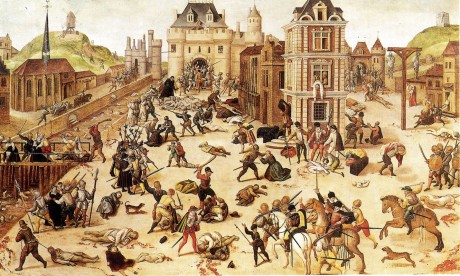
With Robust Economy, Poland Navigates Around Eastern Europe’s Strains
October 7, 2014
Major League Baseball Is Less Competitive Than We Think
October 8, 2014The St Bartholomew’s Day Massacre, by Francois Dubois
How do we win the battle of hearts and minds against Isil, Boris Johnson asked on these pages yesterday? Well, comes one obvious answer, by pointing out that they do nasty things to anyone they perceive as their enemy. This is the tack taken by the US State Department’s latest video, aimed at US Muslims at risk of radicalisation. The 70-second video points out that anyone who signs up with Isil is likely to find himself complicit in the deaths of fellow Muslims, and then provides a gory show reel of Isil inflicting atrocities amongst anyone they consider an enemy. “Are you really capable of this?” That’s the implicit message. “Do you really want to go to Iraq, to do horrific things to our fellow human beings?”
Except, as we all know, many of us are secretly thrilled by the idea of doing horrific things to our enemies. That’s the first problem with using atrocity footage to put young men or women off violent Jihad. Particularly – and I write this, shamefacedly, as a doubting-but-pretty-much-believing Christian – especially where religion is involved. The horrors of the French Wars of Religion, just one example, have rather drifted from our school curricula, but my own work as a literary historian involves reading pamphlet after pamphlet detailing atrocities inflicted by Catholics upon Protestants, and vice versa, on European soil. You might not think of it on your next holiday to Lyon, but only four hundred and fifty years ago, the Rhone ran red with Protestant blood.
We modern sceptics used to assume that the worst of these Elizabethan reports were superstitious fiction. The work of Professor Natalie Zemon Davis, however, has shown that there’s solid evidence to believe even the most anatomically repulsive records of atrocities committed at the 1572 Massacre of St Bartholomew, when ultra-Catholics massacred several thousand Huguenot Protestants. And we can’t blame everything on poverty any more. The old Marxist historians like Eric Hobsbawm or George Rudé looked at riots over grain, bread and cotton prices, to show that all crowd violence was fundamentally economic in nature. But crucially, Zemon Davis’s painstaking analysis of every detail we have about participants in religious violence shows that “more often, the social composition of the crowds extended upwards to encompass merchants, notaries and lawyers”. Looking at Isil’s recruits, we should know this already. Private school girls like Amira Karroum don’t fly to Raqqa because they’re starving. Wealthy polyglots like Islam Yaken aren’t rioting for bread. They may be deluded, but they believe in ideas. And if today’s Middle East has a lesson for the way we look at history, it’s that ideas, not merely grain prices, have consequences.
To understand Isil, Europe must remember what it was to be a continent where religion mattered. Zemon Davis also demonstrated that religious violence mimics religious ritual: in what she has termed “The Rites of Violence”, Catholics “exorcised” Protestants by ritually drowning them in rivers instead of simply dipping them in Holy Water; a Protestant child was baptised in the blood of her parents; bodies were burned in incense in imitation of Old Testament rules for the purification of the unclean animals. When Protestants fought back, their violence could be just as ritualistic and dehumanising, but they focused on profaning Catholic relics or mocking the Mass. The parallels are not exact. In history, they rarely are. St Bartholomew’s Massacre was an incident of urban violence; though well-organised, it was the work of crowds, not a highly drilled Middle Eastern army. But the key point is that religious violence speaks a language of its own. To defeat it, we must break its spell.
None of that makes the religious heritage of Europe sound very appealing. But it is essential to remember that in Europe, with the Reformation, Enlightenment, Emancipation, we’ve moved on. Those of us who still practise a faith – Catholic, Protestant, Muslim or Jew – preserve a sense of sanctity without killing each other over it. Crucially, we’re no longer theocrats: the C of E may tell me adultery is sinful, but the state won’t stone me to death over it. But in moving on too fast, we’ve also lost the religious literacy that tells us why people look to priests and saints for guidance in the first place. There will always be those for whom the post-modern world just seems a bit too fractured, a bit too liberal, frankly, in all its dazzling, confusing choices, a bit too frightening. If we want to keep young Muslims from religious violence, the answer is not secularism, but religious alternatives. The violent history of Christianity shouldn’t be a reason to discredit our religious impulse, but to demonstrate the impossibility of repressing it completely.
And to despite the State Department’s best efforts, we can’t build the moral case against Isil simply by pointing out the cruelties it inflicts upon its enemies. As Professor Ian Robertson points out, that’s not how out-group/in-group dynamics work. Religious fanatics have always slaughtered their enemies – and for radical Sunnis, that includes the Shia. Instead, it is the mundane misery of Isil’s ideal state that should horrify the world. Amira Karroum isn’t scared of being beheaded, because she doesn’t think of herself as an infidel. But once the glamour of war is gone, does she really want to live in an eternal shroud, forbidden from leaving the house, denied an education? Do young British men – one of whom notoriously asked “Do the mujahideen play footy and that?” – understand that a state ruled by blasphemy laws is a state where a wise crack at the local cleric could cost you your life? Many states are forged in war – not all of them then ban music, art and history in peace time.
It is bizarre to imagine that there are people who haven’t made up their minds about the moral toxicity of the so-called Islamic State. It horrifies me that I type this. But clearly, there are – the flow of recruits alone shows that. So don’t imagine that propagating the slaughter of infidels will put them off. We in the media have enjoyed reporting on stories of war crimes. But Isil aren’t just war criminals. Their peace is criminal too.
• Get the latest comment and analysis from the Telegraph


